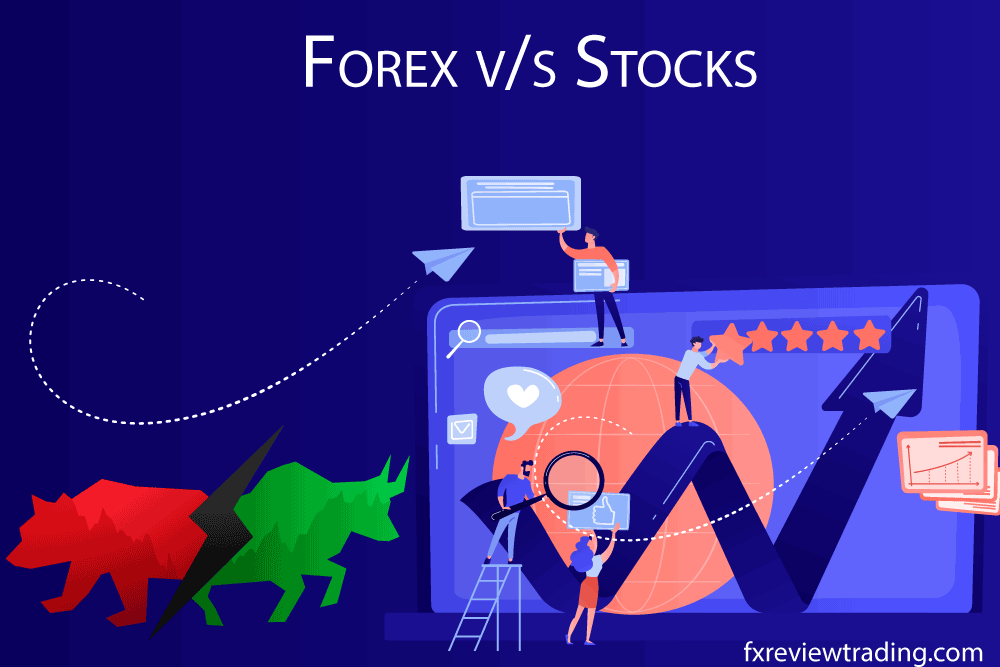The Financial market is a fluctuating entity where no one can accurately predict what will happen next. And when you pitch two of the biggest trading markets against each other, forex v/s stocks, then choosing one would be like belittling the reputation of both.
Stocks and forex have their respective clients and admirers who find spots and invest in the market. They are successful and earn huge returns after investments. What else would a trader or an investor require?
Both are equally great in their spaces and offer exquisite deals that can make investors rich. The volumes are also high, and so is the quotient of volatility. Let’s discuss them quantitatively and on performances.
The Biggest difference: Forex v/s Stocks
The forex market is all about trading currencies of different nations. People buy and sell currency pairs and take positions on them. While in stocks, a person has to purchase shares of a company listed on a stock exchange. These are the units or stakes that a trader buys in a conglomerate or a company.
PS:-More importantly, you should know about the interest and then select either of the two for trading.
Forex v/s stocks: Influences in the markets
Before selecting either of the markets, a trader should inquire about what influences stocks or currency pairs. There are myriad factors that one should consider while putting their funds. Every bazaar is bound by demand and supply game, but what triggers them is a moot point.
While trading in the currency market, you should care about the internal matters of developed countries like the US, UK, Japan, Germany, Switzerland, Canada and others. Their currencies are among the top and get traded the most. In international trading circuits, traders and investors display significant interest in exchanging and selling them against goods.
If there are some civil wars or issues in any of the nations, it may impact your investments. And you might have to escape to some other route of trading.
Moreover, you should consider the macroeconomics of the country while deciding to invest in a currency pair.
For example, you can check the employment and unemployment rate, inflation, gross domestic product, political upheavals, trade policies of a country, to say the least. If any of them is not in place or up to the guidelines drawn by Forex trading authorities, then it is a red flag, avert trading in such circumstances.
Stocks getting influenced
Similarly, if you like a share or a stock and wish to invest in that, then consider the following criteria: Cash flows and earning of the company, comparison of the past and current performance, quality of product and their word of mouth in the market, amount of debts and loans on the company.
Suppose you have the pharmaceutical share, then check the report of how the entire sector is performing and the volumes around it. If everything is honky-dory, then purchase those share and hold them to your capacity. Additionally, news reports can also influence the market, so one should keep an eye on that before transacting.
Trading hours of the market
Every market works according to its scenario and requirement of the public demand. Monitoring the market is akin to deciding profits and losses. If you know the trend or the movement of the market, then the day belongs to you. Stocks and forex markets open at different hours.
And opening hours make it even more critical to predict which way the trend would go. Forex works for the entire day because international trades do not stop even during the wars. However, stock exchanges have specific timings. They have particular timings during which the positions and sessions end.
As per the experts, the best time of trading forex is the overlapping phase, when two sessions overlap each other. The volumes and trades are higher compared to any moment. So, you must track the market at all times because the involvement of risks is equally palpable here. However, there’s no denying the rewards it reaps for traders.
So, the application of stops and limits plays a pivotal role here.
If you try to purchase any currency pair, for example, EUR/USD, make sure the overlapping session is there in place. You can see the expedition in liquid and the flow is higher than at any time of the day. Therefore, there’s a surety of profit-making.
But in stocks, things are quite different. You have to play around with the timing offered by the market. The markets open for five days like the forex, but the timings are more or less 6-7 hours on average. Hence, a trader has to apply all strategies between those clocks.
If you wish to get the market trends right, then opening hours are important for investment and monitoring.
Forex v/s stocks: Liquidity of markets
Liquidity primarily means how well an asset gets traded or available for selling and buying. The acceptability for that entity is enticing for traders and directly related to the profits and losses. If you get hold of a stock or currency pair that does not have any buyer, then that’s risky or in the category of less liquid or rigid assets.
The Stock market sees significant volumes and trades per day. However, it does not apply to all companies, and giant conglomerates like Google, Apple, Netflix, Tesla, Amazon, Disney, Microsoft, Facebook enjoy incredible liquidity. And that’s the reason the fluctuations in their shares are more than any other stock.
Buyers readily put their money and fortunes in them at stake in the hope of bargaining greater returns. Moreover, sellers are equally excited to sell them for making money and buy them again when the market goes bear. These are the blue-chip shares. But once you move away from them, there’s far less liquidity.
The foreign currency market is the king of all transactions worldwide, which crosses USD 6.6 trillion trade on an average in a day. That is huge and bigger than several economies in the world combined. So, you can say, no shortage of liquidity at all.
But Fiber (EUR/USD) is the highest traded currency pair globally, with most of the volumes adhering at its feet. It stems from currencies of the best and reputable economies of the world, the USA and Europe. Hence, it warrants higher returns.
Due to frequent fluctuations and reversible effects triggered by the opening and closing of various sessions in the world market, any pair’s prediction is difficult.
Interestingly, the dollar’s involvement is close to seventy-five per cent in currency pairs as per BIS (Bank of Settlements).
However, there are other currency pairs, but they do not invite much attention from traders due to lesser international trade acceptance.
Commission
Commissions or fees, or charges add up to your transaction cost that takes place in the financial market. Everyone would want a broker that does not ask for such irrational prices or takes in fewer proportions. You can opt for ROinvesting, ETFinance or Global Trade ATF for that purpose.
When an investor trades in the forex market, they get subjected to spread margins, the distinction between selling and buying cost.
Besides, forex spreads are transparent. Thus, people can rely on them in a transaction. The position size before the execution can be calculated using spreads in the currency market.
On the other hand, when you trade stocks, there is a slight commission involved in every deposit or transaction. That is how most brokers fetch their money in stock trading. Also, the spread is applicable to them. So, the cost becomes higher.
Forex v/s stocks: Leverage
Leverage is one tool that can swindle both ways and can become a reason for your blossoming and glooming careers. Hence, while applying it, one should be sure and must have a backing of extra funds if need be.
Leverage has a formidable attachment with the forex market. The volatility and liquidity properties are responsible for it. Traders look forward to earning more bucks in a limited time. So, when the market hits the upward trend, leverage favours the investors. However, perils equally pose a threat to people.
Several brokers provide leverage on currency pairs between 1:30 to 1:500. Moreover, it depends on the type of account you operate with a broker. A VIP, Professional and Ultimate account holder gets an opportunity to avail of 1:500 leverage generally.
PS:- The traders trading on bigger accounts are experts, so it is thoughtful to offer them a higher limit of leverage
In the case of a stock trader, these facilities are available but used in a lesser proportion. One can trade on margins across a range of financial markets.
Conclusion
Concluding which market is better in forex v/s stocks debate won’t do justice in a logical point of view. Both financial entities are bigger than anyone’s anticipation due to the involvement of millions of people worldwide. Both have equal strengths and drawbacks. Plus, they assist economies to grow in their own ways.
Forex v/s stocks is an unending debate. So, let the people decide on their preferences.



